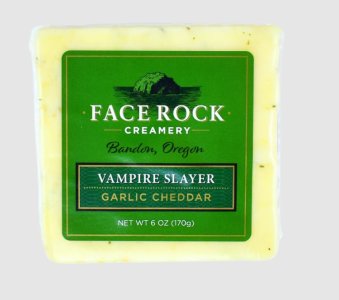
If you’re a cheese lover (and let’s be honest, who among us isn’t?), this is one alert you won’t want to ignore.
Whether you’re team sharp cheddar, mild slices for sandwiches, or the kind that melts like a dream over pasta, your favorite dairy indulgence might be caught in a serious safety scare.
A widely sold cheddar cheese has just been pulled from shelves due to a potentially life-threatening contamination—and yes, it’s the kind you might already have in your fridge.
This isn’t just a routine quality issue; it’s a public health warning that could affect families, foodies, and snackers alike. So before you reach for that next cheesy bite, here’s what you need to know to stay safe and informed.
What’s happened?
Face Rock Creamery LLC, a well-known cheese producer based in Oregon, has issued a voluntary recall for a batch of its Vampire Slayer Garlic Cheddar.
The reason? Potential contamination with Listeria monocytogenes—a nasty bacterium that can cause serious illness, particularly in young children, the elderly, pregnant women, and anyone with a weakened immune system.
The recall was announced after the US Food and Drug Administration (FDA) found traces of listeria in the processing area where the cheese was packaged.
While the finished cheese itself hasn’t tested positive, the company isn’t taking any chances and has pulled the affected product from sale.
What is listeria and why is it so dangerous?
Listeria monocytogenes is a bacterium commonly found in natural environments like soil and water. What makes it especially dangerous is its ability to grow in cold conditions—even inside your refrigerator.
Unlike many bacteria that need warmth to multiply, listeria can quietly persist in chilled foods such as soft cheeses, deli meats, and ready-to-eat items.
For most healthy adults, an infection might cause mild symptoms like fever, nausea, or diarrhea. But for people with vulnerable immune systems—including older adults, pregnant individuals, infants, and those with chronic illnesses—the consequences can be far more severe.
Listeria has been linked to life-threatening complications such as meningitis, and in pregnancy, it can tragically lead to miscarriage or stillbirth.
What are the symptoms to watch for?
Listeria infection can start off with symptoms that resemble a typical stomach illness—fever, headache, nausea, vomiting, and diarrhea. However, if the infection progresses, it may lead to more serious effects such as a stiff neck, confusion, balance issues, or seizures.
If these symptoms appear—especially after eating cheese or deli meats—it’s important to seek medical help immediately.
Recall details and how to get help

If you’ve purchased Face Rock Creamery’s Vampire Slayer Garlic Cheddar, it’s time to check the label.
The recalled product has a use-by date of November 4, 2026, and a UPC of 8 512222 00547 8.
The FDA reports that this particular batch was available only at the Face Rock Creamery retail location in Bandon, Oregon, during a limited window from 3:30 PM on November 10 to 3:30 PM on November 13.
If your package matches these details, do not consume it. Instead, dispose of it safely or return it to the store for a full refund.
While the distribution was limited, it’s always best to double-check—better safe than sorry.
As of November 14, the FDA had not received any reports of illness linked to the recalled cheese.
For questions or concerns, Face Rock Creamery encourages customers to call 541-347-3223 during business hours (Monday to Friday, 9 AM to 4 PM) or email [email protected].
For the latest updates, visit the official Face Rock Creamery announcements page.
In case you missed it:
- An urgent recall on popular tuna and macaroni salad is raising major health alarms.
- FDA issues recall notices for popular superfood sold on Amazon and Walmart due to dangerous contamination.
How can you protect yourself from listeria?
Here are some handy tips to keep you and your loved ones safe:
Stay updated on recalls: Food recalls are listed on the FDA’s Recalls, Market Withdrawals, & Safety Alerts page and the US Department of Agriculture’s (USDA) Food Safety and Inspection Service (FSIS) recall page.
Checking these sites regularly is especially important if you consume specialty items like soft cheeses, deli meats, or ready-to-eat products.
Refrigerate properly: USDA recommends keeping your refrigerator at below 40°F to slow bacterial growth.
Perishable foods should be consumed by their use-by or sell-by dates and stored according to package instructions.
Watch out for high-risk foods: According to the CDC and USDA, foods more likely to carry Listeria monocytogenes include soft cheeses (especially those made with unpasteurized milk), deli meats, smoked seafood, and pâtés.
Pregnant individuals, older adults, and those with weakened immune systems should avoid these unless they’re labeled as pasteurized and handled safely.
Maintain good hygiene: To help prevent cross-contamination, wash your hands, cutting boards, knives, and all surfaces thoroughly after handling raw foods.
Use separate cutting boards, plates, and utensils for raw meat or poultry and for foods that are ready to eat. Keeping these items separate reduces the risk of spreading harmful bacteria.
A word from the expert
Food safety experts remind us that listeria is a common microorganism in the environment, and while most healthy people can fight off a small dose, those in the “over 60s” club need to be extra careful.
Professor Mary O’Riordan, a microbiologist and immunologist at the University of Michigan Medical School, emphasized that listeria is unusual in its ability to grow even in refrigerated conditions—and early symptoms can be subtle and easy to overlook.
If you’re feeling unwell after consuming high-risk foods, it’s important to consult your doctor without delay.
We’d love to hear from you! Have you ever had to return a product because of a recall? Do you have any tips for keeping your kitchen safe? Share your stories and advice in the comments below—your experience could help another member of our community stay healthy and safe.
And remember, when it comes to food safety, it’s always better to be cautious. Stay informed, stay safe, and keep enjoying your favorite cheeses (just maybe double-check the label first!).






